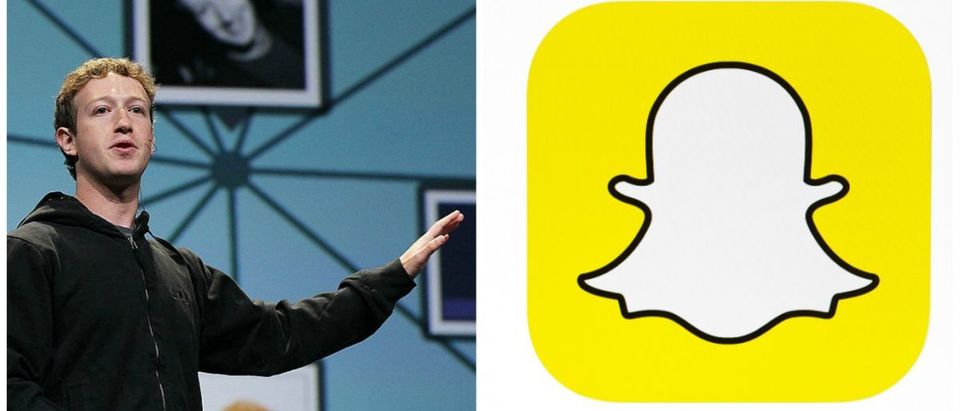Facebook has been actively trying to emulate Snapchat for some time now, which became even more evident after the social media company apparently tried to purchase a foreign clone company of Snapchat.
Facebook made an unsuccessful bid over the summer to acquire Snow, a Snapchat-esque service owned by Naver, a $25 billion-valued Korean tech firm, according to a TechCrunch report on Monday.
Snow, which has around 80 million downloads currently, is predicted to increase its download total by 10 million each month, reports TechCrunch. Apparently, Facebook isn’t the only one that has showed a desire.
“It’s true that Snow is receiving love calls from various companies,” a representative from Naver told TechCrunch.
This is not the first time Facebook has taken assertive measures to imitate, rival, or even acquire Snapchat (and similar companies).
DIRECT PITCH
Facebook offered to directly buy Snapchat for $3 billion in 2013 after its stock valuation dropped 3 percent in a day and its number of daily teenage users were slipping.
“SLINGSHOT”
Slingshot, a messaging app similar to Snapchat, was launched by Facebook in 2014. One of the few key differences: a picture message reply was needed in order to open the original message. Slingshot was removed roughly a year later.
INCORPORATION
Not too long after the failure of Slingshot, Facebook tried to incorporate disappearing content — a Snapchat mainstay — into its Messenger app, according to BuzzFeed. The experimentation phase only made it so far and it was ultimately not implemented. (RELATED: Facebook Is Forcing Users To Download Its Messenger App)
AND ONCE AGAIN…
Facebook tried to incorporate the disappearing option once more in 2016, according to The Guardian, by coupling the feature with other security updates for Messenger. (RELATED: Facebook Is Making Messenger The Go-To App For Everything On Your Phone)
“POKE”
Facebook decided to transform the once-popular virtual prodding feature called “Poke,” into a standalone app that had some very similar functions to Snapchat. After downloading Facebook Poke, users were asked to compose a message, record a photo or video for Facebook friends, and then set the limit for how long the content will be accessible (with a maximum option of 10 seconds), according to The Guardian. The app only lasted 12 days.
“LIFESTAGE”
Tailored for teenagers attending school, Lifestage was a standalone app created by Facebook that was intended to introduce users to their fellow classmates at their respective educational institutions. The app would ask for a number of personal aspects, such as likes, dislikes, best friend(s), certain facial expressions and then create a video profiles for others to watch, reports TechCrunch. It was essentially an easy, virtual way to introduce oneself to others (albeit in an arguably impersonal way).
“INSTAGRAM”
Facebook acquired Instagram, an online mobile photo-sharing and social networking service, in April of 2012 for $1 billion. More than four years later, under Facebook’s umbrella, Instagram introduced “Instagram Stories.” This new feature provides users the option to share their photo and video content for up to 24-hours to all friends and followers at once — a function that Snapchat is fairly famous for.
“You’ll see stories from people you follow in a bar at the top of your feed — from your best friends to your favorite popular accounts,” an official Instagram blog post reads. “When there’s something new to see, their profile photo will have a colorful ring around it.”
FACEBOOK GOES FESTIVE
The social media conglomerate furthered testing of a new camera feature in its main app roughly a week ago that employs the same video and photo capabilities (like filters) that Snapchat users enjoy.
AND ONCE AGAIN…
Only a day later, Facebook introduced functionality that allowed for Halloween-inspired virtual masks that overlays a users’ face.
Facebook’s attempts to capture, even corner, the image instant messaging market doesn’t seem to be panning out — but given its most recent attempts, it likely won’t stop trying.
Send tips to eric@dailycallernewsfoundation.org.
All content created by the Daily Caller News Foundation, an independent and nonpartisan newswire service, is available without charge to any legitimate news publisher that can provide a large audience. All republished articles must include our logo, our reporter’s byline and their DCNF affiliation. For any questions about our guidelines or partnering with us, please contact licensing@dailycallernewsfoundation.org.


